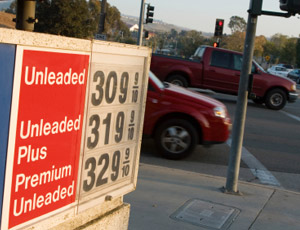Whenever rustics Living In Rockland County, N.Y., want to relieve some of the stress of driving in the New York City area—traffic at the Lincoln Tunnel, bumpy, pot-holed streets—we head for New Jersey to gas up our tanks. When I pull into places such as the Lukoil on Piermont Road inNorthvale, N.J., the lower price of gas makes me feel like I’ve just pulled a scam.

On the New Jersey side of the Hudson, I can buy a gallon of regular this week for $3.169, instead of the $3.449 a gallon I would pay at a Gulf station on Highland Avenue in Nyack, N.Y. As it turns out, the difference in the cost of gasoline, and the virtuous sense of thrift that I get from buying in New Jersey, is mostly the result of that state’s low gas tax of only 14.5 cents per gallon. In New York, Connecticut and Pennsylvania, the gas taxes are 44.4, 41.8 and 32.2 cents, respectively.
The rest of the regional gas tax and transportation story is about as relaxing as a blowout on the turnpike. Higher-level transportation planning for the region is tied up now with a fight between New Jersey Governor Christopher Christie (R), who canceled the cross-Hudson commuter rail tunnel project saying the Garden State couldn’t afford its share of the heavy cost, and his Democratic opponents from New Jersey, New York and Washington, D.C., who want the tunnel built.

KORMAN
The Christie administration wants to use New Jersey’s portion of the federal tunnel money for road and bridge work the state needs but can’t afford because its underfunded Transportation Trust Fund is depleted. Ray LaHood, the U.S. Secretary of Transportation, wants New Jersey to pay back $270 million in federal money he says the state spent on the early phases of the tunnel.
Christie can blame the trust fund mess on his predecessors, but it’s still his job to figure out what to do. New Jersey’s Transportation Trust Fund has spent more than its annual revenue for years on end, and all of the nearly $900 million that flows into the fund each year will be needed for debt service starting in fiscal year 2012 and continuing for 30 years. James Simpson, the state transportation commissioner, said last year, “Sometimes I feel like I work for the state treasury, not transportation, because my senior leadership team and I have devoted so much time and energy to the department’s finances and funding needs.”
None of this is good news to me. If the Obama administration punishes Christie by starving New Jersey for federal road funds, all of us in the area will take the hit because we all use those roads. The Port Authority of New York and New Jersey, which was to build the tunnel for a N.J. Transit commuter rail line, once embodied the idea that government public authorities could create needed public works relatively free from interference even from the governors of New York and New Jersey, who appoint the agency’s staff chief. Now, political manipulation is more common.
后隧道的demise has been a roller-coaster of rising and falling expectations. When New York City Mayor Michael Bloomberg’s staff started looking into the possibility of extending to New Jersey one of the new subway tunnels being built in Manhattan by the Metropolitan Transportation Authority, the No. 7 line, I felt hopeful. I decided to forgive Bloomberg for muscling the City Council into changing the rules so he could run for a third term. Later, I realized the mayor’s tunnel extension idea has so many obstacles, such as no money to do the work, that it has few chances of becoming a reality.
The reality is that New Jersey’s artificially low gas tax spreads problems across state lines because we are all part of an interdependent system. The gas tax has to go up, with all the hardship that involves, if we’re going to have balance and cooperation. If your priority is keeping taxes so low that you won’t spend for public works most people agree are needed, even risky, costly tunnels, you aren’t serious about doing what governments do. You belong at a Libertarian Party convention or aFriedrich Hayekstudy group, but not in Trenton, where a great state needs some foresight as well as budget cutting. It’s time to charge what driving actually costs.





Post a comment to this article
Report Abusive Comment